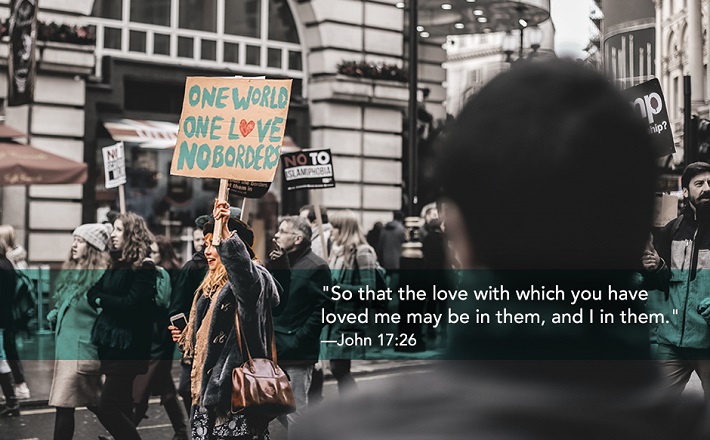Commentary on Acts 16:16-34
The book of Acts emphasizes the power and abilities of the leaders of the Jesus movement.
As a result of the numerous miracles performed through Paul and Peter, the church grows daily. Overcoming any obstacle that is presented, they go about proclaiming to the world that Jesus died and was raised so that all could come into relationship with the living God. This gospel that they preach is a way of salvation, but is this also a path to liberation? This text challenges us to consider — what does it mean to be free?
Spiritual chains
The story of Paul and Silas’ miraculous jailbreak may be a familiar narrative; however, I have not always read it in the context of the enslaved girl who had a spirit of divination, another form of bondage. She, in fact, is doubly oppressed — she is a possession of both her owner and of a spirit of divination. And yet her deliverance is not presented as many other miracles in the book of Acts. Most miracles in this book are performed so that many may come to believe. However, in this case it seems her deliverance comes about simply because she is being annoying.
The nameless enslaved girl follows Paul around declaring: “These men are slaves of the Most-High God, who proclaim to you a way of salvation.” Despite how exasperating her antics may have been, her statement is true. Paul, himself, proclaimed to be a slave of Jesus Christ (Romans 1:1). So why is Paul seemingly perturbed by this girl? Perhaps it is because she had followed them for many days. On this occasion, Paul turns and says to the spirit: “I order you in the name of Jesus Christ to come out of her.” Was Paul disturbed that they were being followed or was this girl’s declaration difficult for Paul to come to terms with? Isn’t she claiming that she and Paul were not that different at all? They were both enslaved people; they simply had different masters.
Although Paul’s actions free her from her possession, she remains an enslaved girl whose master is now angry because without her supernatural abilities she can no longer provide them with income. She is described as having “brought her owners a great deal of money by fortune-telling.” But what if we understand her announcement for what it was — simply a “voice crying out in the wilderness” declaring the way of the Lord? Though one could argue that Paul improved her spiritual condition, Paul clearly did not improve her physical condition. In fact, Paul leaves her in an even more precarious situation than she was in before she had encountered him.
Physical chains
While the no longer possessed girl is free from her demon, Paul and Silas’ freedom is taken away. The “master” of the enslaved girl accuses Paul and Silas of “disturbing the city” asserting: “they are Jews and are advocating customs that are not lawful for us as Romans to adopt or observe.” Paul and Silas are stripped of their clothing, beaten with rods and thrown into prison where the jailor was instructed to “keep them securely. Following these instructions, the jailor puts them in the innermost cell and fastened their feet in the stocks.” Paul and Silas are now physically imprisoned.
They were bound physically, but not for long. They pray and worship and the jail doors are opened; their shackles are loosed. Not only are their chains loosed; all the prisoners are set free. The jailer, assuming there had been a prison break, contemplates taking his own life. This disturbing side note pulls the curtain back on the dangerous nature of life in the first century. Let’s not ignore the warning.
Why would a mistake on one’s job be seen as so horrific that s/he would invite death, rather than face the consequences or shame of admitting to a mistake? Is this kind of pressure self-imposed or a product of a hostile political environment? It is clear that the shadow of the empire looms large here; Rome is mentioned numerous times in Acts 16. Moreover, the cost of maintaining the Pax Romana (the peace of Rome) was terribly high. The cost was brutal military enforcement of law and order. It seems that jailor, too, needed salvation. As a society, we must be cautious of the ways in which the rhetoric of law and order can work in opposition to justice and peace.
When Paul informs the jailer that all the prisoners are still there and accounted for, the jailer and his household come to believe in Jesus and are saved. Following the established pattern of the text, the prison break miracle results in the growth in the Jesus movement. But before we rejoice in Paul and Silas’ freedom, we must remember there is a local girl who is still enslaved. What becomes of her? Does she remain in bondage to an angry owner?
The text leaves us with the questions, but not the answers. By highlighting these forms of bondage, I wish to suggest that these areas of our lives (emotional, spiritual, physical) are entangled. And perhaps more importantly, I would purport that the holy work of healing must be holistic, that is it must consider the entire person.
While prayer and worship can lead to the loosening of shackles that are physically visible, what happens when we remain bound in ways that are not readily apparent? What if the prison break story isn’t about Paul and Silas (although we do like a hero(s))? What if the prison break is teaching us that liberation is a communal act? Recall that everyone’s chains were broken, not a select few. As civil rights leader Fannie Lou Hamer declared: “Nobody’s free until everybody’s free.” Our collective liberation requires that we first acknowledge our connectedness.
If freedom is the removal of a hindrance, making the path clear, then perhaps liberation is an extension of this condition and is the ability to live into that freedom. The impediments of social structures that are designed to limit and take away freedoms results in a world where the capacity for justice and peace are diminished. As a result, the people of God must work to make the path clear, to remove the obstacles, to remember the enslaved girl as clearly as we remember Paul and Silas. Ultimately, our liberation is connected to her freedom.


June 2, 2019